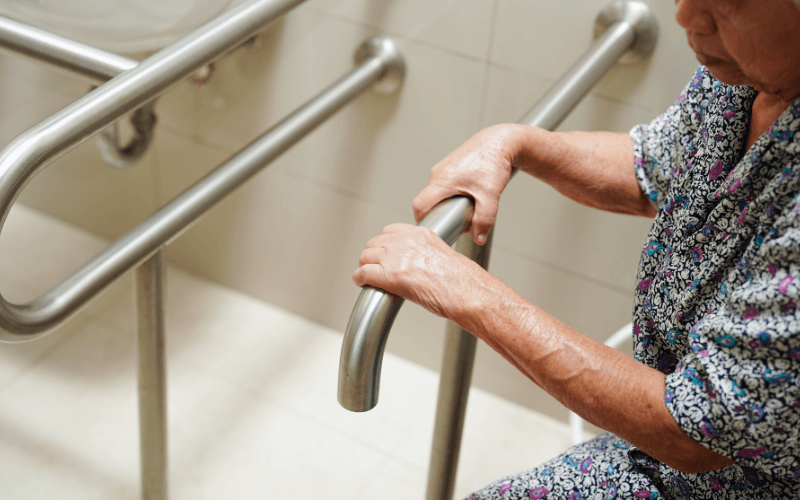Ageing in Place: Practical Strategies for Maintaining Independence
For many older Australians, the ability to live independently in their own home or “ageing in place” is not just a preference but a key factor in their overall well-being. Studies show that 78-81% of Australians over the age of 55 prefer to remain in familiar surroundings, where they feel safe and connected to their community.
However, successfully ageing in place requires more than just the desire to stay at home. It involves careful planning, the right support systems, home modifications, and access to assistive technologies, such as personal alarms, to ensure safety, comfort, and independence.
In this blog:
What is Ageing in Place?
Ageing in place means staying in your own home and maintaining independence for as long as possible, rather than moving into aged care facilities. This approach supports autonomy and well-being, allowing older adults to remain connected to their community, family, and familiar routines.
According to the National Institute on Aging (NIA), staying at home can promote better health outcomes by providing a sense of familiarity, security, and emotional stability, especially for those managing chronic conditions or cognitive changes.
While ageing in place is an appealing option, successful independent living requires thoughtful preparation and support.. It involves ensuring the physical and mental capacity to live alone, making home modifications, using assistive technology, staying socially active, and having access to necessary healthcare and emergency support systems.
Related Reading: Modern Ageing: Here's Why It's an Opportunity, Not a Threat
What Are The Benefits of Ageing in Place?
1. Maintaining Independence and Control
One of the greatest benefits of ageing in place is the ability to maintain independence and make personal decisions, from daily routines to lifestyle choices, without the restrictions of an aged care facility.
This sense of control and autonomy enhances confidence, emotional well-being, and motivation, allowing seniors to continue enjoying hobbies, social interactions, and daily activities on their terms.
2. Comfort and Familiarity
Home is more than just a place, especially for seniors who have filled their homes with memories, personal belongings, and a sense of security. Living in a familiar environment reduces stress and confusion, particularly for older adults with cognitive conditions like dementia.
Staying in a familiar place and community where they recognise their surroundings can be comforting for seniors who may otherwise feel afraid if transferred to a different place that they are unfamiliar with. This can also encourage them to maintain social connections or join in community activities in their neighbourhood.
3. Stronger Social Connections
Remaining in the community means seniors can stay connected with friends, family, and neighbours. They usually also establish relationships with people who provide their services, such as doctors and hairdressers, making it easier for them to meet their regular needs.
Social interactions provide seniors with a sense of security and help prevent loneliness and isolation, which are common challenges in aged care facilities. For seniors who may find it more difficult to build new connections now that they are older, being in a place where they have already made theirs makes it mentally easier for them than having to worry about meeting new people.
4. Better Health Outcomes
Studies on seniors in Australia and New Zealand show that those who choose to age in place often experience better physical and mental health than those in institutional care. Living in a home environment allows for personalised healthcare, with options such as home visits from healthcare professionals, telehealth consultations, and customised support services.
Seniors who choose to stay in their own homes or with their relatives also feel that they are more comfortable seeking the services of their health practitioners since they already know their health records throughout the years. This makes them more open to sharing what they are experiencing or need help with, as compared to dealing with health professionals in facilities.
5. Cost-Effectiveness
Aged care facilities can be expensive, with ongoing fees for accommodation, medical care, and additional services. Ageing in place is often a more affordable option, especially when supplemented with home modifications and in-home care services tailored to individual needs.
Seniors who also have relatives who can provide them with assistance prefer to stay at home since this cuts down the costs of getting professional assistance. Some also live in a tight-knit community where they can get support whenever they need it, making this kind of setup more comfortable for them financially and mentally.
Key Strategies for Ageing in Place Safely
1. Home Modifications for Safety and Accessibility
A safe home environment is essential for independent living. Falls are among the most common causes of injury-related hospitalisations for older Australians, and simple home modifications can help reduce risks and improve mobility and confidence.
Essential Home Safety Modifications:
Install grab rails and handrails in bathrooms and staircases for extra support.
Improve lighting in hallways, stairwells, and bedrooms to prevent falls at night.
Use non-slip flooring and remove loose rugs to minimise tripping hazards.
Ensure step-free entryways with ramps or widened doorways for easier mobility.
Conducting a thorough home assessment with your older relative ensures that modifications are practical and meet their daily needs.
Related Reading: 9 Home Modifications That Can Promote Independence when Ageing in Place
2. Utilising Assistive Technologies
Modern technology offers innovative solutions that empower older adults to maintain their independence. These technologies improve safety and provide seniors and their loved ones with a sense of security and peace of mind that they are safe and can get help whenever needed.
Some of the most effective assistive technologies include:
Personal alarms: Wearable emergency devices from Tunstall Healthcare provide immediate access to help at the push of a button. These alarms can connect seniors to emergency response teams, ensuring swift assistance when needed.
Smart home automation: Voice-controlled lighting, temperature control, and security systems enhance convenience and safety.
Mobility aids: Walkers, stairlifts, and electric scooters help seniors move around their homes and neighbourhoods with ease.
Medication management tools: Automated pill dispensers and reminder apps help ensure medications are taken correctly and on time.
3. Staying Socially Connected
Loneliness and social isolation can have negative effects on the mental and physical health of seniors. For those who are living in places far from their family and friends, elderly individuals may find it hard to stay connected with them. Studies suggest that maintaining an active social life may help lower the risk of depression and cognitive decline, and this can be easier if they are staying in their homes and joining social activities.
Some ways to stay engaged include:
Joining community groups: Participating in local clubs or senior programs can help build friendships and provide a sense of belonging.
Volunteering: Engaging in volunteer work can give a sense of purpose to the elderly and allow them to meet new people.
Attending social events: Engaging in social activities like book clubs, exercise classes, or hobby groups keeps the mind active, engaged, and interested in the things that they love to do.
Using digital communication tools: Video calls, social media, and messaging apps help seniors stay connected with family and friends, even from a distance.
Related Reading: Social Connectedness: Your Prescription to a Healthier, Happier, and Longer Life
4. Accessing In-Home Support Services
While independence is key, having access to professional support services can make ageing in place safer and more manageable. Government-funded programs, such as My Aged Care, offer support services that enable seniors to live independently for longer. Having these in-home support services assures that elderly loved ones can get assistance when they need it.
Some essential in-home services include:
Personal care assistance: Trained professionals can assist with daily activities such as bathing, dressing, and grooming, important for those who have physical limitations.
Meal preparation and nutrition support: Access to nutritious meals is crucial for maintaining good health, especially for seniors who may find it difficult to cook for themselves.
Household maintenance: Services like cleaning, gardening, and home repairs ensure a safe and comfortable living environment.
Healthcare at home: Many medical services, including nursing care, physiotherapy, and telehealth consultations, can be accessed from home.
The Role of Personal Alarms in Independent Living
Personal alarms can be a valuable tool for seniors who prefer to age in place. They provide immediate access to emergency assistance, allowing seniors to call for help in case of a fall, sudden illness, or any other urgent situation. Government funding options are also available and offer an affordable and effective solution for enhancing safety and independence.
Personal alarms like the Tunstall Gem4 and the Tunstall Gem5 can be very useful for seniors who are ageing in place. It provides peace of mind for them and their loved ones that they are safe and secure while living independently.
The Tunstall Gem4 and Gem5 offer:
24/7 emergency response: Ensures seniors can get help at any time of the day or night. Ensuring help is available at any time, day or night.
GPS tracking: Allows emergency responders or family members to locate the user quickly, an important feature, especially for seniors who have dementia or mobility issues.
Fall detection technology: Automatically detects falls and alerts emergency contacts.
Ageing in place is more than just staying at home—it’s about living safely, independently, and comfortably. With the right home modifications, assistive technologies, and support systems, seniors can enjoy a high quality of life while maintaining their autonomy.
Contact us today to find the best solutions for safe and independent living.
Keep Reading: What You Need To Know About Independent Living for Seniors




